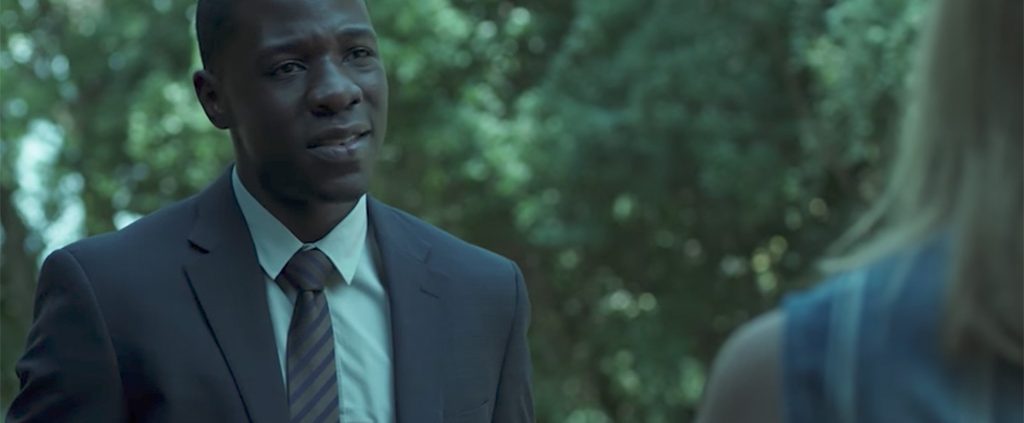Ozark and dealing with the consequences
Screenshot taken from Official Trailer
Written By Simon Moetara, New Zealand
What if you make choices based on your own personal gratification, but never stop to consider the consequences of your actions? Ozark, a popular crime thriller series that’s now showing on Netflix, explores this idea as it follows the story of financial planner Marty Byrde (played brilliantly by Jason Bateman), who along with his partner Bruce launder money for the second largest drug cartel in Mexico.
Marty is living a sterile and joyless life with his wife Wendy (Laura Linney), who is cheating on him, and Charlotte and Jonah, their two teenage kids. When Bruce is caught stealing from the Cartel and executed, the Cartel plans to kill everyone associated with the enterprise, including Marty. However, Marty convinces the Cartel representative that he can launder US$500 million in five years in the cash-rich tourist area of the Missouri Ozarks. So Marty packs the family up and heads off to the Lake Ozark area, where he finds trying to launder money in a small resort-community more difficult than he realized.
[WARNING: Some spoilers follow] A later episode retrospectively reveals how Marty began working with the Cartel. Initially, Marty isn’t interested. However, things are tough. Wendy is pregnant, and things are financially tight. Slowly, we see Marty’s moral principles shift ever-so-slightly, a step at a time, as he is wooed by the charismatic cartel boss Camino Del Rio.
As he discusses the deal with Wendy, we see Marty rationalize his gradual slide down the slippery moral slope: “I wouldn’t be a mule. I wouldn’t be a dealer. I’d be just pushing my mouse around my desk.”
Watching Marty rationalize his decision is uncomfortable. Seduced by the money and the lifestyle that accompanies it, he thinks himself far removed from the ugliness of the business. This utopian illusion comes crashing down when Marty, having accepted the invitation, is forced to watch as his predecessor is brutally murdered for being suspected of dealing with the Feds. He now realizes there is no neutral ground.
The book of James has a passage that seems apt at this point: “Temptation comes from our own desires, which entice us and drag us away. These desires give birth to sinful actions. And when sin is allowed to grow, it gives birth to death” (James 1:14-15). The apostle Paul writes to his protégé Timothy: “Those who want to get rich fall into temptation and a trap and into many foolish and harmful desires that plunge people into ruin and destruction” (1 Tim 6:9). And there is plenty of ruin and destruction resulting from the desire for more in Ozark.
One reviewer describes Ozark as “one of the darkest shows on TV”. And it is. The Ozarks is a place where the ravages of corruption, revenge, addiction, avarice, and murder are commonplace. In protagonist Marty Byrde, we witness the warts-and-all portrayal of a brilliant but flawed human being who mistakenly trusts in his own abilities and resourcefulness to save himself and others.
Christian pop-culture commentator Stephen Woodworth sees the show’s brilliance in “its truthful depiction of life without hope. Life all alone. Life without a lifeline.” As Marty responds to each crisis, things go from bad to worse, and we see him sliding deeper into the hole that he’s trying to escape. Marty rejects the idea of a guiding hand of providence; there is no divine power to cry out to, no Savior to rescue him. Many of the characters are trapped in a hell of their own making.
Choices and Consequences
A trailer announcing the second season of Ozark is captioned, “You made your choice. Now deal with the consequences.” The importance of our decisions and dealing with the consequences of our actions forms a constant theme throughout the series, as Marty expounds on the significance of choices as he discusses finances, moral principles, and work ethics.
We also see this played out in the biblical story. A key example is that of King David, who suffered greatly as a result of poor choices. He commits adultery with Bathsheba and murders her husband Uriah. David later receives forgiveness from God, but the consequences of his choices continue to echo through into the next generation. David’s son Amnon rapes his sister Tamar; then, in retaliation, David’s son Absalom kills Amnon. David does nothing. Absalom then rebels against his father, and is later killed (2 Sam 11-18). From this point, David’s life and reign falls into ruin. Did God forgive David? Yes he did; but David had to suffer the consequences of his ruinous run of bad choices.
In Ozark, we see a similar chain of bad choices and devastating consequences. Every choice has a consequence, and each character must live with his or her choices.
What choices await all these characters in the upcoming seasons? Can the morally compromised Marty Byrde find redemption for himself and his family? Or will he continue down the road to destruction?
Series one finishes with a momentous choice. The Cartel, the local heroin kingpin, and the FBI are closing in. Wendy, Charlotte, and Jonah, rather than going on the run with new identities, choose to return to the Ozarks so they can be with Marty and remain a family. It’s a truly touching moment. But I can’t help but think that there are going to be consequences for their choice.
As Christians, we know that God has created us with the ability to freely choose, and sometimes we must deal with the aftereffects of our bad choices. But we can live in the certain knowledge that even though we might have to experience the consequences of our poor decisions, our sin has been paid for by Great David’s greater Son and God’s empowering presence will be with us every step of the way. He will provide strength and comfort for us as we endeavor to turn from worldly ways and walk the righteous path.










Leave a Reply
Want to join the discussion?Feel free to contribute!